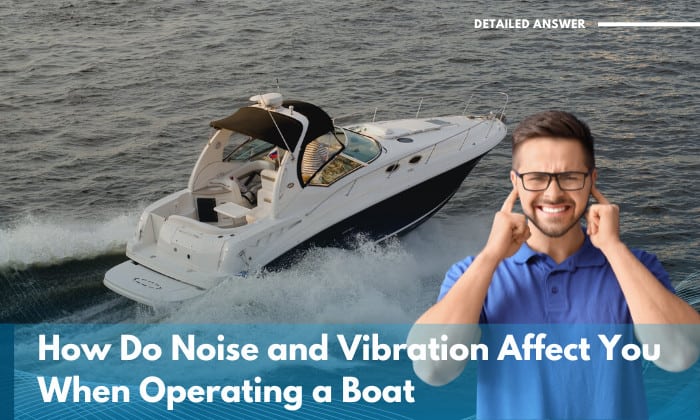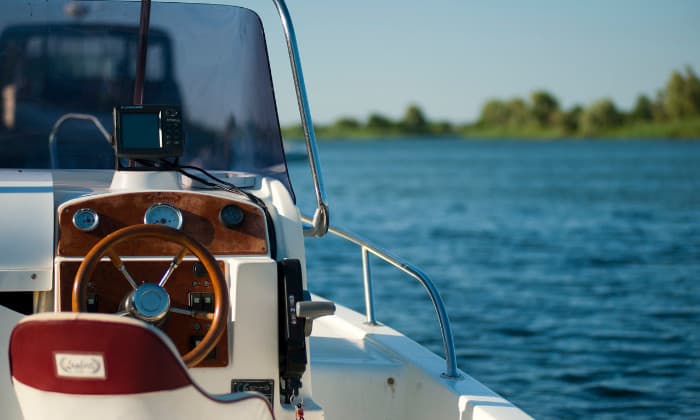For all the enjoyment it brings, we can’t deny that operating a boat is often a noisy activity.
Many people place the blame on the engine. More often than not, full throttle means full-throated noise, which is only worsened by issues like faulty equipment.
What more if we factor in the vibrations produced by turbines, or uncontrollable factors like winds and waves?
All of these lead us to wonder, “How do noise and vibration affect you when operating a boat?” They have a great effect, particularly on your cognitive abilities, mood, and reaction time.
Find out why by reading the science behind it.
Table of Contents
Why Do Boaters Deal With a Lot of Noise and Vibration?
To be clear, not all boats are noisy. If you’ve ever ridden a slow-moving engine-less vessel, you’ll without a doubt say that it makes close to zero noise.
Whether it’s a sailboat or canal boat with displacement hulls, as long as it doesn’t pick up speed, you’ll be spared from the buzz and vibrations. Based on first-hand experience, I can say the same if it’s being towed by a motor-driven boat a good distance away in still waters.
Unfortunately, those are the limited conditions that make noise-free boating possible. Boat vibration causes are numerous, after all. They can arise due to the following:
- The moment a boat picks up speed and the wind. The waves will start lapping and crashing, while the wind starts whistling and howling and beating against your ears. Before long, they become ambient sounds you have to get used to, as you can’t control them.
- When the engine springs to life and starts to rev up, you have no choice but to prepare for the auditory assault. It’s not exactly desirable white noise, since it varies in frequency, but that’s not to say that some folks like it.
- Even the propellers can be culprits, but they have no choice since they were designed to push water out. They also tend to be the number one source of vibrations, besides the shaft.
- Turbines may also produce plenty of vibration if they’re not well-maintained.
How Do They Affect Your Health?
Since high vibration and noise are consequences of boating and not the activity per se, we have to look at their detrimental effects as a whole instead.
- Believe it or not, constant exposure to vibrations can actually dampen your mood and even affect your sleep. After all, you’re basically being bombarded by stressors constantly. This leads to a domino effect that results in long-term physical and mental fatigue.
- That effect can also be felt in how you deal with people and your relationships in general.
- Consistent noise exposure may lead to hearing loss.
- Noise and vibrations have also been proven to affect reaction times and decision-making capabilities. That’s a double whammy, since we all know how important both are for optimal boat operation.
- Constant exposure to noise and vibration heightens the risk of depression and anxiety.
- Vibration exposure due to hand tools puts you at risk of getting Raynaud’s syndrome, which can extensively damage your hands, arms, and fingers. Symptoms include nerve pain, numbness, and poor circulation around those areas.
- It also raises your risk for physical injury.
The good thing is there are rules in place to limit exposure to both for all boat operators.
Noise and Vibration Limits
- How many decibels can you safely work with? From the shore, a boat should not produce more than 75 dB. If it’s idle and measured three feet from the transom, it shouldn’t reach more than 88 dB as a legal requirement for boat operation.
However, some states may have different limits or may not have one at all, such as the cases of Alaska, Arkansas, Delaware, Florida, Indiana, and Louisiana, among others.
- The International Maritime Organization also prescribes noise limits for different areas of a ship, such as 75 dB for machinery control rooms and 60dB for cabins and hospitals in boats with a gross tonnage of up to 10,000.
Use a decibel meter or an app to measure the exact decibels in your engine room. While these may not be accurate 100% of the time, they should be able to help you adhere to noise and vibration laws.
How to Protect Yourself From Noise and Vibration When Boating
- The best approach is to mitigate both at the source as much as possible. If you’re buying a new boat, for example, you may want to look at those with quieter propulsion engine
This includes addressing issues that may be causing noise and vibrations and prioritizing regular boat maintenance.
- Learn how to soundproof your boat. Consider mounting absorption panels and door sealings in rooms with the most noise and vibrations.
- Wear headphones and earplugs and do your best to limit the time you spend in rooms where the undesirable sounds, droning, and shuddering are heard and felt the most.
- If your boat has a dedicated engine room, one smart move you can take is to install the right insulation in it.
Here’s a video on Youtube that involved this exact project. I suggest you watch it to learn the process involved, especially if you’re planning to dampen your own engine’s noise.
Conclusion
So, to sum up the answer to “How do noise and vibration affect you when operating a boat?” boats inevitably become noisy once they pick up speed, and the wind and waves start crashing against them from all sides.
Whether it’s cacophony or harmony, we can’t deny that they can be distracting and can be detrimental to your health with long-term exposure. As it stands, I can’t stress the importance of abiding by laws pertaining to limiting the negative effects of noise and vibration enough.

“My intention from the first day establishing Boating Basics Online is to provide as much help as possible for boaters who want to experience a first safe and convenient trip. So feel free to join us and share your beautiful journeys to the sea!”



